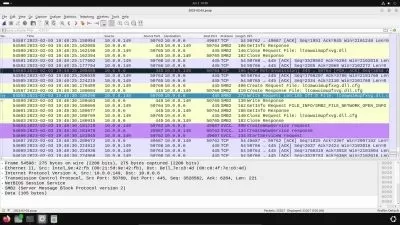About Network SecurityLearn More
Network security includes regulations and policies taken by network management, which are formulated and applied in order to prevent and monitor unauthorized access, abuse, modification, or restriction in computer networks and resources available in the network.
Sort by:
Sorting
The newest
Most visited
Course time
Subtitle
Courses
Subtitles

Master Security Automation & Post-Quantum Crypto for CompTIA SecurityX
1:02:28
English subtitles
11/13/2024
Subtitles

Ultimate SSCP Systems Security: Master Cloud & Endpoint Defense
1:59:16
English subtitles
12/24/2024
Frequently asked questions about Network Security
From businesses to banks, nearly every organization maintains an internal computer network. Network security refers to the discipline of preventing, detecting, monitoring, and mitigating security intrusion. Network security professionals use software platforms, special tools, policies, processes, and network configurations to protect systems from intrusion. Network security professionals will be called upon to create a network that is not likely to be compromised, maintain this network, and regularly audit the network for new security gaps. As cybersecurity is constantly changing (and new vulnerabilities are continuously being found), the network security landscape is also evolving. As a discipline, network security has been growing for many years.
Information security analysts, security consultants, cybersecurity experts, and other cybersecurity professionals will use network security principles. At entry-level, a Networking Associate would use basic network security principles in their work. A network analyst or network architect would also use network security. Programmers and application developers would need to consider network security when developing programs that work on a network or access the internet. Other network security positions include information security managers and chief information security officers. Many titles in network security directly relate to creating, maintaining, or updating network security initiatives, protocols, and technology.
A career in network security is fitting for those who embrace challenge and problem-solving. A network security professional must be able to perform rigorous, predictable tests. They have to assess and reassess the same solutions—and they must be passionate and eager to problem solve. Because the network security market shifts frequently, the ideal candidate will be someone who loves learning and enjoys updating their skills. Developers, networking professionals, programmers, and help desk professionals can all transition their existing skills into network security. There are many courses on Udemy that can provide foundational knowledge of network security and general networking expertise, even for those who don't have a background in technology.
Data analysis, computer programming, information systems management, risk management, and process management represent some of the essential skills for those interested in learning network security. Network security professionals must think creatively and out of the box and communicate effectively with those who don't understand technology. Security professionals should also have a basic understanding of computer networks and how they work. Udemy has many classes on entry-level networking, networking certification paths, and the network security focus.


















